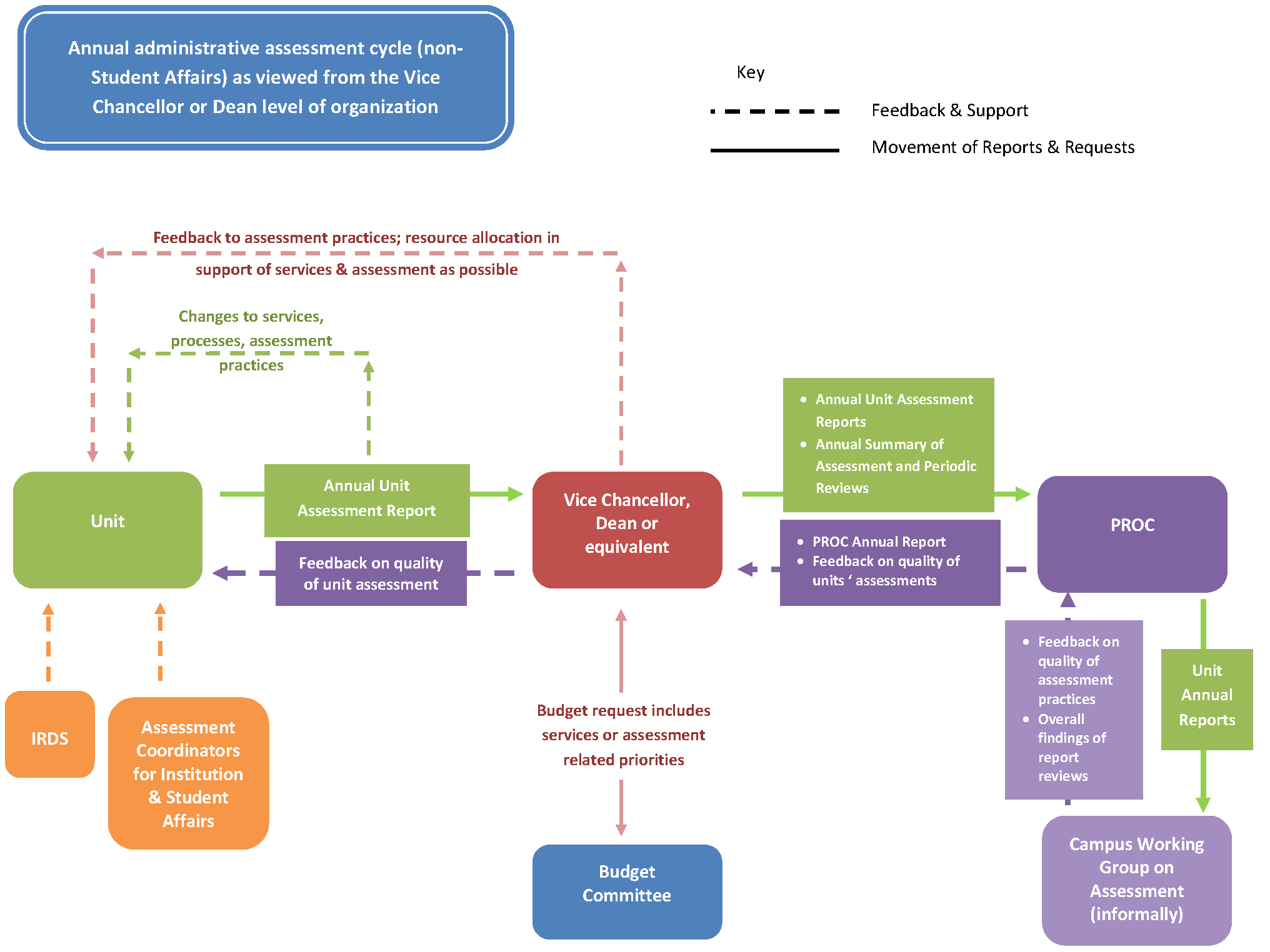Why We Do It
Annual administrative assessment promotes regular engagement in evidence-based planning and continuous improvement in support of an administrative unit's service goals. Ongoing attention to service needs is particularly important for a new and growing institution. It is also essential to achieving excellence in UC Merced's mission of research, teaching and service, as every administrative unit contributes uniquely to the achievement of institutional priorities.
How We Do It
Annual assessment is guided by an umbrella policy that outlines the minimum requirements for assessment processes that are grounded in the mission, goals, and intended service and/or learning outcomes of an administrative unit. Page 6 of the policy describes the relationship between goals and outcomes, as well as the difference between service and learning outcomes.
In practice, annual assessment involves an evidence-based appraisal of the extent to which a unit meets desired service outcomes, with the goal of acting to improve the unit's effectiveness. Although assessment methods will vary among units, as per policy all annual administrative efforts involve:
- development of an assessment plan. Grounded in the unit’s mission, the plan articulates the unit's core service outcomes and identifies lines of evidence for assessing the degree to which outcomes are met. Multi-year plans outlining the unit's core set of service objectives, the type of evidence to be gathered for for each objective, the year(s) it will be gathered and the year each outcome will be reviewed/assessed are encouraged. This type of planning ensures sufficient evidence is available to support a unit's planning decisions. It also promotes efficient use of assessment tools like surveys, as they can include questions addressing multiple service outcomes and be run less frequently as a result.
- gathering the evidence;
- analyzing and interpreting the evidence relative to intended levels of performance;
- using these results to identify and implement actions to improve the degree to which the unit meets its outcome goals. Actions should address both the unit’s service activities and its assessment practices, particularly as the latter affects a unit’s ability to meaningfully appraise its efficacy.
- consideration of assessment findings and next steps in formulating the unit’s budget;
- reporting assessment methods, results and actions to be taken at the unit and Division/School levels
The draft Criteria to Guide Quality Administrative Assessment Practices is intended to support the design of assessment practices and their evaluation as summarized in an annual report. Consistent with the focus on assessment for improvement, a key goal is gathering evidence that provides insight into how the unit might improve performance as necessary (i.e. the findings are actionable) and then acting on findings as necessary.
Strategies for gaining actionable information vary depending on whether the outcome is service or learning based. Regardless of the assessment methodology employed, however, a powerful approach to ensuring the evidence will be actionable is to anticipate - during the development process - possible results and how the unit might respond.
For example, a question asking survey respondents to rate the quality of a service (ex. very satisfactory to very unsatisfactory) might be enhanced with a follow-up question that asks respondents to explain ratings of unsatisfactory or very unsatisfactory. Depending how the question is worded, the former without the later could, for example, reveal that a substantial fraction of customers are dissatisfied but yield no information about the reasons for the dissatisfaction and thus no specific ideas for addressing the concerns as a step to improve service quality. Evidence or measures that have impact yield information that suggests one or more courses of action to improve performance.
All administrative entities led by a dean, vice chancellor or equivalent, engage in assessment annually, with the lead administrator sharing with the chancellor (or designee) and the Periodic Review Oversight Committee (PROC) an annual assessment report that includes:
- a brief summary and evaluation of each reporting unit's progress, as provided in the unit's annual assessment report;
- a summary of resource needs identified through the assessment process, including priorities in the budgeting process;
- as relevant, responses to any institutional assessment initiatives;
- each reporting unit's annual assessment report
The figure below depicts the annual assessment process workflow. In keeping with existing practices in academic and student affairs, UC Merced is establishing a review-and-feedback process to support continued development of assessment practices in administrative units.
Click here to see this figure enlarged in a separate window.

When we do it
While PROC has established a general, annual report submission date of June 30, deans, vice chancellors or equivalents may establish an annual submission date that accords with the unit's annual budgeting timeline and process. To do so, please notify PROC through a memo to its co-chairs via the PROC analyst.
Annual reporting dates are available here.
Support
Address questions about the annual assessment process for administrative units to the Coordinator for Institutional Assessment Laura Martin.
Additional resources are available on the Policies, Guidelines, and Templates page of this site.
Last updated June 21, 2015

